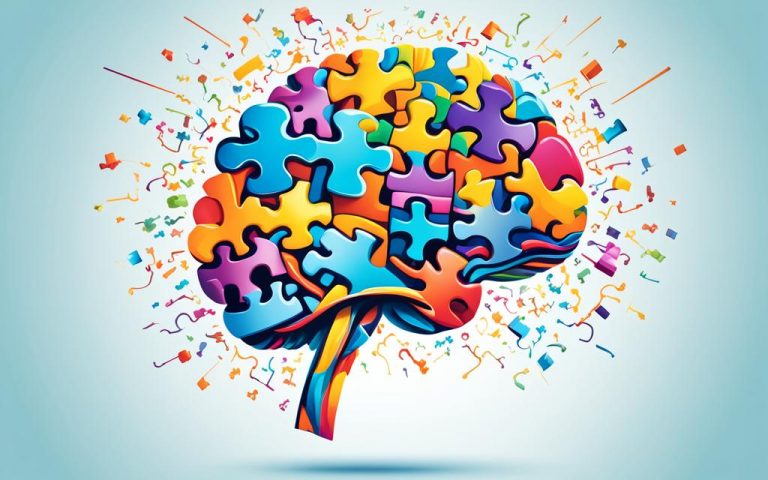Explore Benefits of Humanistic Psychology Therapy
Welcome to our article on the benefits of humanistic psychology therapy. If you are seeking a holistic approach to therapy that promotes personal growth and emotional well-being, humanistic psychology therapy may be the right choice for you. This therapeutic approach focuses on the whole person, recognizing the interconnectedness of mind, body, and spirit.
Humanistic psychology therapy emphasizes personal growth and self-actualization. It encourages individuals to explore their emotions, beliefs, and values, and supports them in finding their own unique path in life. By embracing this approach, you can embark on a journey of self-discovery and unleash your full potential.
In addition to personal growth, humanistic psychology therapy also enhances emotional well-being. Through a safe and supportive environment, you can explore and process your emotions, gaining a deeper understanding of yourself. With the help of specific counseling techniques, you can develop healthy coping mechanisms and improve your overall emotional well-being.
The human-client relationship is a vital aspect of humanistic psychology therapy, particularly in person-centered therapy. This therapeutic alliance fosters trust, empathy, and understanding between the therapist and client, creating a conducive environment for healing and personal transformation.
Existential therapy, another component of humanistic psychology therapy, addresses existential concerns and the search for meaning in life. By exploring these profound questions, individuals can develop a greater sense of purpose and live a more authentic existence.
Furthermore, humanistic psychology therapy takes a holistic approach to healing. It recognizes that individuals are complex beings with interconnected facets of well-being. By addressing the mind, body, and spirit, this therapeutic approach aims to restore balance and wholeness, promoting a sense of overall well-being.
If you’re curious about how humanistic psychology therapy is applied in practice, you’ll discover the use of various therapeutic techniques such as active listening, empathy, and unconditional positive regard. These techniques create a supportive and nurturing therapeutic environment, facilitating personal growth and healing.
In conclusion, humanistic psychology therapy offers numerous benefits for those seeking personal growth and emotional well-being. By embracing this holistic approach, you can embark on a transformative journey of self-discovery, foster deep emotional healing, and develop a greater sense of purpose in life. Consider exploring humanistic psychology therapy as a path to holistic wellness and personal fulfillment.
Key Takeaways:
- Humanistic psychology therapy promotes personal growth and self-actualization.
- It enhances emotional well-being through a safe and supportive environment.
- The human-client relationship is vital in humanistic psychology therapy.
- Existential therapy addresses existential concerns and the search for meaning.
- Humanistic psychology therapy takes a holistic approach to healing.
Understanding Humanistic Psychology Therapy
In this section, we will provide an overview of humanistic psychology therapy, which encompasses the humanistic approach to therapy, client-centered therapy, and person-centered therapy. By exploring the underlying principles and techniques used in this therapeutic approach, you can gain a deeper understanding of how it promotes personal growth and emotional well-being.
Humanistic Approach to Therapy
The humanistic approach to therapy emphasizes the individual’s capacity for self-actualization and personal growth. It recognizes that each person has unique experiences, values, and aspirations, and focuses on empowering the individual to make positive choices and take control of their own life.
Client-Centered Therapy
Client-centered therapy, also known as person-centered therapy, is a key component of humanistic psychology therapy. Developed by Carl Rogers, this approach is based on the fundamental belief that individuals have the innate ability to grow, heal, and resolve their problems. The therapist provides a non-judgmental, empathetic, and supportive environment where the client can explore their thoughts, feelings, and experiences openly.
One of the core elements of client-centered therapy is the therapeutic relationship between the therapist and the client. This relationship is characterized by unconditional positive regard, empathy, and genuineness. It encourages the client to express themselves authentically and promotes self-discovery and personal growth.
“The curious paradox is that when I accept myself just as I am, then I can change.” – Carl Rogers
Person-Centered Therapy
Person-centered therapy builds upon the client-centered approach by emphasizing the importance of the individual’s unique perspective and subjective experience. It recognizes that each person has an intrinsic desire for self-actualization and supports them in aligning their actions with their core values and beliefs.
In person-centered therapy, the therapist aims to create an atmosphere of trust, acceptance, and understanding. By providing a safe space for the client to explore their thoughts and emotions, the therapist encourages self-reflection, self-acceptance, and personal growth.
| Humanistic Approach to Therapy | Client-Centered Therapy | Person-Centered Therapy |
|---|---|---|
| Emphasizes personal growth and self-actualization | Focuses on creating a non-judgmental and supportive environment | Recognizes the unique perspective and subjective experience of the individual |
| Empowers individuals to make positive choices | Builds a therapeutic relationship based on unconditional positive regard and empathy | Supports individuals in aligning their actions with their core values |
| Promotes self-discovery and personal growth | Encourages self-expression and exploration of thoughts and emotions | Facilitates self-reflection and self-acceptance |
Embracing Personal Growth
Humanistic psychology therapy is rooted in the belief that personal growth and self-actualization are fundamental components of human nature. By embracing personal growth, individuals can unlock their full potential and lead a more fulfilling life. This section will explore the various techniques and strategies used in humanistic therapy to foster personal development and empower individuals to thrive.
Techniques for Personal Growth
Humanistic psychology therapy employs a range of techniques aimed at nurturing personal growth. These techniques focus on enhancing self-awareness, self-acceptance, and self-discovery. By providing a supportive and non-judgmental environment, therapists encourage individuals to explore their authentic selves and transform their lives.
- Self-Exploration: Through reflective exercises and introspection, individuals are guided to delve into their thoughts, emotions, and experiences. This process aids in uncovering underlying beliefs and patterns that may be influencing their behavior.
- Empowerment: Humanistic therapy empowers individuals to identify their strengths and build upon them. By recognizing their unique qualities and capabilities, individuals gain the confidence to overcome challenges and pursue personal growth.
- Goal Setting: Setting realistic and meaningful goals is an integral part of the personal growth journey. Therapists collaborate with individuals to establish objectives that align with their values, aspirations, and personal development.
- Self-Expression: Expressive techniques such as art therapy, journaling, or role-playing can facilitate personal growth. These methods provide alternative avenues for individuals to communicate and explore their thoughts and emotions.
- Mindfulness: Practices like meditation, deep breathing, or body scans cultivate present-moment awareness and facilitate personal growth. By practicing mindfulness, individuals can develop a deeper connection with their inner selves and cultivate self-compassion.
The Impact of Personal Growth
“Personal growth is not a destination; it is a lifelong journey of self-discovery and transformation.”
Embracing personal growth through humanistic psychology therapy can have profound effects on individuals’ lives. As individuals engage in the process of self-exploration and self-improvement, they may experience:
- Increased self-confidence and self-esteem
- Enhanced emotional intelligence and self-awareness
- Improved relationships and communication skills
- Greater resilience and ability to cope with challenges
- Heightened overall well-being and life satisfaction
By embracing personal growth, individuals can cultivate a deeper understanding of themselves, their values, and their aspirations. This empowers them to make conscious choices in alignment with their true selves, leading to a more authentic and purposeful life.
Enhancing Emotional Well-being
When it comes to your emotional well-being, humanistic psychology therapy offers a safe and supportive environment where you can explore your deepest emotions. This therapeutic approach recognizes the importance of addressing your emotional needs and aims to promote healing and growth.
Creating a Safe Space for Emotional Exploration
One of the key aspects of humanistic psychology therapy is providing a safe space for individuals to express and process their emotions. By creating an environment free from judgment and criticism, you are encouraged to explore your emotions openly and honestly.
Quote: “Humanistic psychology therapy provides a non-judgmental and empathetic space for individuals to process their emotions and find healing.” – Dr. Mary Johnson, Humanistic Psychologist
Utilizing Humanistic Counseling Techniques
Humanistic psychology therapy utilizes specific counseling techniques that are designed to enhance emotional well-being. These techniques aim to facilitate emotional healing, encourage self-reflection, and promote a sense of empowerment.
One such technique is active listening, where the therapist listens attentively, offering empathy and compassion. This allows you to feel heard and understood, enhancing your emotional well-being.
Another technique is reflection, where the therapist helps you explore your emotions and thoughts by mirroring and summarizing your feelings. This promotes self-awareness and deeper emotional understanding.
The use of affirmations is also prevalent in humanistic psychology therapy. Through affirmations, you are guided to acknowledge and appreciate your strengths and positive qualities, fostering a sense of self-worth and emotional well-being.
Image
The Power of the Human-Client Relationship
In humanistic psychology therapy, the human-client relationship plays a pivotal role in facilitating growth and healing. Particularly in person-centered therapy, this therapeutic alliance forms the foundation for transformative change. By focusing on the individual’s unique experiences and innate potential, person-centered therapy emphasizes the importance of authenticity, empathy, and trust between the therapist and the client.
This deep connection between the therapist and client cultivates an environment of safety, acceptance, and understanding. It allows clients to explore their thoughts, feelings, and vulnerabilities without judgment, while empowering them to take an active role in their own therapy journey.
Through the power of the human-client relationship, person-centered therapy fosters growth, self-discovery, and personal transformation. As the therapist demonstrates unconditional positive regard and empathy, clients feel heard, validated, and valued. This strengthens their sense of self-worth and encourages them to embrace their unique strengths and potential.
By truly understanding and empathizing with the client’s experiences, therapists in person-centered therapy create a space where individuals can explore their emotions, gain insights, and discover their own solutions. This collaborative process fosters self-empowerment, enabling clients to make meaningful changes and achieve personal growth.
Creating a Safe and Supportive Space
“The therapist of person-centered therapy is not an expert or authority figure but rather a compassionate facilitator who walks alongside the client in their journey of self-discovery.” – Carl Rogers
Person-centered therapy places great importance on creating a safe and supportive space for clients to express themselves freely. This environment allows individuals to delve into their deeper feelings, beliefs, and desires, leading to a greater understanding of themselves and their experiences.

Through active listening and unconditional positive regard, therapists in person-centered therapy demonstrate genuine empathy and understanding. This empathic connection builds mutual trust and encourages clients to open up, share their innermost thoughts, and explore their emotions without fear of judgment or rejection.
The therapeutic relationship in person-centered therapy is characterized by collaboration, respect, and equality. The therapist views the client as the expert of their own life, recognizing that the client possesses the inherent capacity for growth and self-actualization. By fostering a strong human-client relationship, person-centered therapy provides a nurturing environment for individuals to explore their inner selves, cultivate self-acceptance, and develop a greater sense of personal agency.
Embracing Existential Therapy
As a vital component of humanistic psychology therapy, existential therapy addresses profound existential concerns and the search for meaning in life. This therapeutic approach recognizes that individuals may grapple with questions about their purpose and the inherent challenges of existence. By embracing existential therapy, individuals can embark on a journey of self-discovery, attaining a more authentic and fulfilling existence.
The Holistic Path to Healing
When it comes to therapy, a holistic approach that addresses the mind, body, and spirit can have a profound impact on your well-being. Humanistic psychology therapy embraces this holistic path to healing, recognizing the interconnectedness of various facets of your life. Through this approach, you can experience a sense of balance and wholeness as you embark on your journey towards self-discovery and emotional growth.
Humanistic psychology therapy goes beyond merely treating symptoms and aims to understand the underlying causes of your struggles. By exploring the mind, body, and spirit, this approach offers a comprehensive and personalized treatment plan that caters to your unique needs.
Imagine a therapist who not only listens to your thoughts and feelings but also considers your physical and spiritual well-being. This integrative approach allows you to address the root causes of your challenges and create lasting change in all aspects of your life.
One of the key principles of humanistic psychology therapy is the belief in your innate capacity for self-actualization and personal growth. Through holistic therapy, you can tap into your inner resources, uncover your true potential, and embrace a more fulfilling and purpose-driven life.
“The humanistic approach to therapy emphasizes the importance of viewing individuals as whole and unique beings, rather than focusing solely on their symptoms or problems. This holistic perspective allows for a deeper exploration of the mind, body, and spirit, ultimately leading to a more comprehensive and transformative therapeutic experience.”
The Benefits of Holistic Therapy
By embracing the holistic path to healing, you can experience a range of benefits that extend far beyond traditional therapy approaches. Here are some of the advantages:
- Improved self-awareness and self-acceptance
- Enhanced emotional well-being and resilience
- Greater clarity and insight into your life’s purpose
- Increased self-confidence and self-esteem
- Improved relationships and communication skills
- Greater connection with your inner self and spirituality
With its focus on the mind, body, and spirit, holistic therapy provides a comprehensive framework for personal growth and transformation. It allows you to address all aspects of your being, fostering harmony and equilibrium for a more fulfilling and meaningful life.
| Benefits of Holistic Therapy | Description |
|---|---|
| Improved self-awareness and self-acceptance | Gain a deeper understanding of yourself and develop a greater sense of self-acceptance and self-love. |
| Enhanced emotional well-being and resilience | Strengthen your emotional well-being and develop resilience to cope with life’s challenges. |
| Greater clarity and insight into your life’s purpose | Gain clarity and discover your life’s purpose, helping you make meaningful decisions and choices. |
| Increased self-confidence and self-esteem | Build confidence and improve your self-esteem, enabling you to approach life with a positive mindset. |
| Improved relationships and communication skills | Enhance your relationships and communication skills, fostering deeper connections with others. |
| Greater connection with your inner self and spirituality | Develop a stronger connection with your inner self and explore your spirituality, finding meaning and purpose in life. |
Embarking on a holistic path to healing through humanistic psychology therapy can lead to transformative change and a renewed sense of well-being. By addressing the mind, body, and spirit, you can uncover your true potential, nurture your inner self, and create a life filled with meaning and authenticity.
Applying Humanistic Psychology Therapy in Practice
Now that you have gained an understanding of humanistic psychology therapy, let’s explore how it is applied in practical settings. In this section, we will delve into the common therapeutic techniques used in this approach, providing you with valuable insights into the therapeutic process.
Humanistic psychology therapy adopts a client-centered approach, wherein the therapist creates a safe and supportive environment for individuals to explore their thoughts, feelings, and experiences. Through the use of various therapeutic techniques, the therapist aims to facilitate personal growth, self-awareness, and emotional healing.
The Therapeutic Techniques
Humanistic psychology therapy utilizes several therapeutic techniques designed to empower individuals and facilitate their journey towards positive change. Here are some of the most commonly employed techniques:
- Active Listening: Therapists actively engage in attentive listening, suspending judgment and demonstrating genuine empathy. This technique creates a space for individuals to express themselves freely and feel understood.
- Empathy: Therapists strive to understand their clients’ experiences from their perspective, fostering a deep sense of empathy. By acknowledging and validating their feelings, the therapist establishes an authentic connection.
- Unconditional Positive Regard: Therapists maintain an accepting and nonjudgmental attitude towards their clients, emphasizing their inherent worth and unconditional support. This technique encourages individuals to embrace self-acceptance and develop a positive self-image.
- Gestalt Therapy: This technique focuses on enhancing self-awareness by exploring the present moment and the integration of thoughts, emotions, and behaviors. It encourages individuals to take responsibility for their actions, promoting personal growth and self-empowerment.
- Existential Therapy: This approach addresses existential concerns, such as the search for meaning and purpose in life. It encourages individuals to confront existential anxieties, establish personal values, and make choices that align with their authentic selves.
Throughout therapy sessions, the therapist collaborates with the client to develop tailored intervention plans based on their unique needs and goals. By combining these therapeutic techniques, humanistic psychology therapy creates a nurturing and empowering environment for personal growth.
A Glimpse into a Typical Session
While every therapy session is unique and tailored to the individual, let’s take a glimpse into what a typical humanistic psychology therapy session may entail:
“Therapist: Good morning! How are you feeling today?
Client: I’ve been struggling with some intense emotions lately.
Therapist: Thank you for sharing. Let’s take a moment to explore those emotions together. Remember, I’m here to listen and support you unconditionally.”
In this session, the therapist creates a safe space for the client to express their emotions openly. Through active listening and empathy, the therapist establishes trust and demonstrates genuine care. The therapy session progresses with the client exploring their emotions, thoughts, and experiences, guided by the techniques employed by the therapist.
The therapist ensures that the client feels heard, understood, and valued throughout the session. Together, they work towards personal growth, emotional healing, and a deeper understanding of the self.
Now that you have gained insight into the application of humanistic psychology therapy, you can appreciate its transformative potential. In the next section, we will wrap up our exploration of this therapeutic approach and summarize the key benefits it offers for personal growth and emotional well-being.
Conclusion
Humanistic psychology therapy offers numerous benefits for personal growth and emotional well-being. By embracing a holistic path to healing, individuals can embark on a journey of self-discovery and self-actualization. Through this therapeutic approach, clients are empowered to explore their emotions, enhance their well-being, and cultivate a stronger sense of self.
One of the key advantages of humanistic psychology therapy is its focus on the individual’s unique needs and experiences. By embracing an empathetic and non-judgmental stance, therapists foster a safe and supportive environment where clients can freely express themselves and gain a deeper understanding of their thoughts and feelings.
Furthermore, humanistic psychology therapy emphasizes the importance of the human-client relationship. In person-centered therapy, the therapeutic alliance between the therapist and the client plays a vital role in promoting trust, empathy, and mutual understanding. This collaborative partnership provides a solid foundation for personal growth and allows clients to explore their challenges and aspirations with confidence.
In conclusion, humanistic psychology therapy offers a powerful and transformative approach to personal development. Its emphasis on holistic healing, individualized care, and the human-client relationship sets it apart as a valuable therapeutic modality. By embracing this approach, individuals can embark on a journey of self-discovery, enhance their emotional well-being, and unlock their full potential.
FAQ
What is humanistic psychology therapy?
Humanistic psychology therapy is a therapeutic approach that emphasizes the individual’s inherent capacity for personal growth and self-actualization. It focuses on creating a supportive and non-judgmental environment where individuals can explore their feelings, thoughts, and experiences.
What is the humanistic approach to therapy?
The humanistic approach to therapy is a therapeutic perspective that prioritizes the unique subjective experiences of individuals and their potential for personal growth. It emphasizes the importance of self-awareness, self-acceptance, and self-actualization in the therapeutic process.
What is client-centered therapy?
Client-centered therapy, also known as person-centered therapy, is a form of humanistic psychology therapy that focuses on the individual’s subjective experience and empowers clients to take an active role in their therapeutic journey. The therapist provides a supportive and empathetic environment, allowing the client to explore their feelings and experiences at their own pace.
What are the benefits of humanistic psychology therapy?
Humanistic psychology therapy offers numerous benefits, including increased self-awareness, improved self-esteem, enhanced personal growth, and a deeper understanding of oneself and others. It can also help individuals develop effective coping mechanisms, improve relationships, and achieve a greater sense of meaning and fulfillment in life.
What are some humanistic therapy techniques used in therapy?
Humanistic therapy techniques include active listening, empathy, unconditional positive regard, reflection, and open-ended questioning. These techniques create a safe and nurturing space for individuals to explore their emotions, gain self-insight, and develop coping strategies.
How does humanistic psychology therapy enhance emotional well-being?
Humanistic psychology therapy enhances emotional well-being by providing a supportive and non-judgmental environment where individuals can freely express their emotions and explore their inner experiences. Therapeutic techniques such as empathy, active listening, and reflection help individuals develop a deeper understanding of their emotions and learn healthy ways to manage them.
What is the role of the human-client relationship in humanistic psychology therapy?
The human-client relationship is a cornerstone of humanistic psychology therapy, particularly in person-centered therapy. It is based on trust, empathy, and understanding between the therapist and client. This therapeutic alliance facilitates a safe and nurturing environment for individuals to explore their emotions and experiences.
What is existential therapy in humanistic psychology therapy?
Existential therapy is an approach within humanistic psychology therapy that focuses on addressing existential concerns, such as the search for meaning and purpose in life. It helps individuals explore their values, beliefs, and choices, guiding them towards a more authentic existence and a deeper understanding of themselves.
What does holistic therapy entail in humanistic psychology therapy?
Holistic therapy in humanistic psychology entails addressing the interconnectedness of an individual’s physical, emotional, mental, and spiritual well-being. It recognizes that these aspects of a person’s life are interdependent and aims to restore balance and wholeness by addressing all aspects of their being.
What are some common therapeutic techniques used in humanistic psychology therapy?
Some common therapeutic techniques used in humanistic psychology therapy include active listening, empathy, unconditional positive regard, reflection, and open-ended questioning. These techniques help create a safe and nurturing space for individuals to explore their emotions, thoughts, and experiences in-depth.







